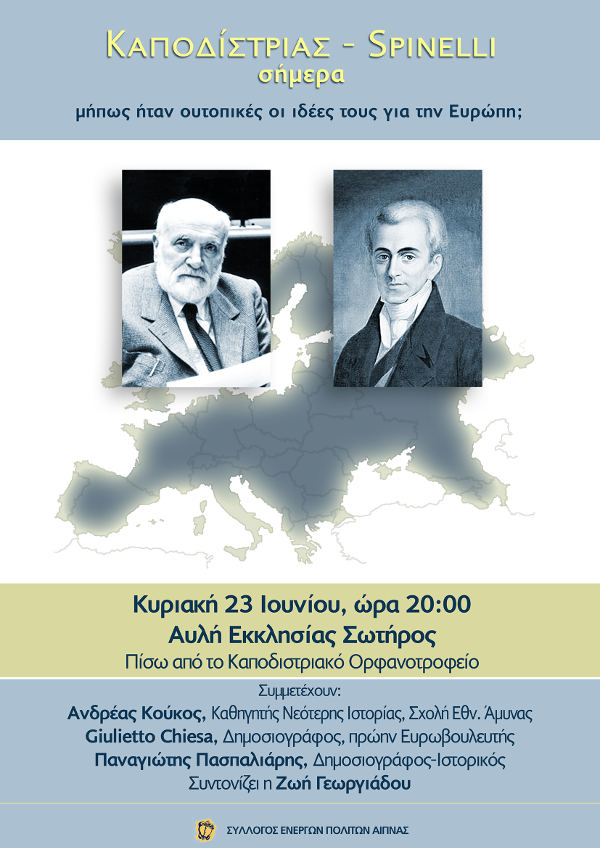Ο Γουεϊν Χωλ μέλος του Συλλόγου Ενεργών Πολιτών της Αίγινας συντονίζει την συζήτηση με τους Δημ. Στασινόπουλο δικηγόρο, Παν. Πασπαλιάρη δημοσιογράφο / ιστορικό, Γεώρ. Δημητρίου αρχιτέκτονα και τον Χρ. Κοτσιρέα φωτορεπόρτερ /δημοσιογράφο του vmedia.
Ευρωπαϊκή Ένωση: Διάλυση ή επανεκκίνηση;
Με εξαιρετική επιτυχία πραγματοποιήθηκε στις 23 Ιουνίου στο προαύλιο του Ναού του Σωτήρος του Καποδιστριακού Ορφανοτροφείου η εκδήλωση με τίτλο, «Καποδίστριας – Σπινέλλι, Σήμερα: Ευρωπαϊκή Ένωση: Διάλυση η επανεκκινηση ;» που διοργάνωσαν οι Ενεργοί Πολίτες της Αίγινας, με την υποστήριξη του Δήμου, δίνοντας συνέχεια στις σχετικές προηγούμενες πρωτοβουλίες.
Σε αυτό τον συγκινητικό, ιστορικό και μαγευτικό συνάμα χώρο της πόλης της Αίγινας, ένα πολυάριθμο κοινό άκουσε με μεγάλο ενδιαφέρον, για δυόμιση ώρες, τις εισηγήσεις των κυριων Παναγιώτη Πασπαλιαρη, Ανδρέα Κουκο και Giulietto Chiesa και στην συνέχεια έκανε παρατηρήσεις, ερωτήσεις και σχόλια. Ο δήμαρχος της Αίγινας Σ. Σακκιώτης χαιρέτισε τη εκδήλωση τονίζοντας την ιδιαίτερη προσφορά των “Ενεργών Πολιτών στην προβολή της καποδιστριακής κληρονομίας της Αίγινας ως Πρώτης Πρωτεύουσας. Ανήγγειλε δε την εγρήγορση του Δήμου και της Πολιτείας για την προώθηση της συντήρησης και αξιοποίησης των καποδιστριακών κτηρίων του νησιού μας όπου σύντομα θα αρχίσουν τα σχετικά έργα, αρχής γενομένης από το Κυβερνείο το οποίο έχει ήδη δημοπρατηθεί. .
Ανοίγοντας την εκδήλωση, ο κύριος Wayne Hall, ως βασικός συντελεστής, αναφέρθηκε στις προηγούμενες εκδηλώσεις των Ενεργών Πολιτών με τον ίδιο τίτλο στην Αίγινα από το 2008 που είχαν σκοπό να ανανεώσουν τις αναφορές στο πρωτοποριακό και τιτάνιο έργο του Ιωάννη Καποδίστρια στην Αίγινα, στην Ελλάδα άλλα ιδίως στην Ευρώπη, συνδυάζοντας το με εκείνο του συντάκτη του πρώτου Ευρωπαϊκού Συντάγματος της ΕΕ, Α. Σπινέλλι.
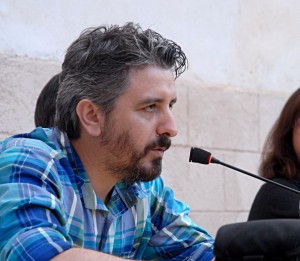 |
| Π. Πασπαλιάρης |
Στη συνέχεια, ο ιστορικός και συγγραφέας Παναγιώτης Πασπαλιάρης ανέπτυξε με λαμπρό τρόπο, το θέμα των δημιουργικών διπλωματικών δραστηριοτήτων του Ι. Καποδίστρια ως στελέχους και κατόπιν Υπουργού Εξωτερικών της Ρωσίας πριν, κατά την διάρκεια και στην επόμενη περίοδο του Συνεδρίου της Βιέννης του 1814 που σηματοδότησε το τέλος της Ναπολεόντειας εποχής και την αναδιοργάνωση της Ευρωπαϊκής ηπείρου. Τόνισε δε με έμφαση, μεταξύ άλλων, την λυτή, απερριτη, και ακούραστα μεταρρυθμιστική παρουσία του Ι. Καποδίστρια σε αντίθεση με την σπάταλη, γεμάτη χλιδή και σκάνδαλα παρουσία των εστεμμένων και των επιτελείων τους που σκοπό είχαν να επαναφέρουν τις παλιές ισορροπίες πάνω στους λαούς της Ευρώπης. Όπως είπε, η μελέτη των δραστηριοτήτων του πρώτου κυβερνήτη της Ελλάδας φαίνεται να τον αναδεικνύει ως τον σημαντικότερο μεταρρυθμιστή διπλωμάτη για τη προώθηση των δημοκρατικών αρχών σε όλη την ευρωπαϊκή ήπειρο. Την πείρα και τις διασυνδέσεις αυτής της περιόδου, ο Καποδίστριας την έθεσε κατόπιν στην υπηρεσία του οράματος για το οποίο τελικά έδωσε την ζωή του, δηλαδή την ανάδυση του Νέου Ελληνικού Κράτους.
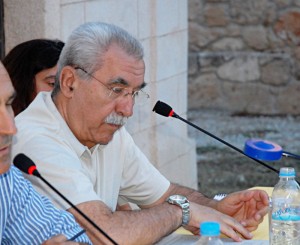 |
| G.Chiesa |
Ο πρώην ευρωβουλευτής και δημοσιογράφος Giulietto Chiesa μετέφερε κατόπιν τον έντονο προβληματισμό του για την σημερινή κρίση στον ευρωπαϊκό χώρο και ιδιαίτερα στις χώρες του Νότου, ευχαριστώντας τους Ενεργούς Πολίτες που του έδωσαν την ευκαιρία να ανακαλύψει τον Καποδίστρια και το έργο του στην Ευρώπη σε συνδυασμό με την προσφορά του Α. Σπινελλι, στα θεμέλια της ΕΕ. Υπογράμμισε το έλλειμμα δημοκρατίας που διαρκώς μεγεθύνεται σήμερα μέσα στην ΕΕ αναδεικνύοντας το νευραλγικό και κυρίαρχο ρόλο του χρηματοπιστωτικού κόσμου, ιδίως των τραπεζών, και μάλιστα της Ευρωπαϊκής Τράπεζας, η οποία είναι ΝΠΙΔ, έναντι της υποβάθμισης των δημοκρατικών ευρωπαϊκών θεσμών. Παρατήρησε ότι η σημερινή κρίση του ευρώ είναι στην πραγματικότητα κρίση του δολαρίου, συνέπεια της κρίσης των sub-primes. Πρότεινε στην συνεχεία την ενδυνάμωση των δημοκρατικών θεσμών της Ευρώπης και συγκεκριμένα την εθνικοποίηση των κεντρικών τραπεζών των ευρωπαϊκών χωρών όπως και της ΕΚΤ.
Αναφέρθηκε μάλιστα στη διάθεση 1 τρισεκατομμύριο ευρώ από την ΕΚΤ προς τις τράπεζες του ευρωπαϊκού χώρου, με τόκο 1%, κεφάλαια τα οποία οι τράπεζες χρησιμοποίησαν για να δανείσουν τις χώρες του νότου με 4%, δηλαδή με σοβαρό κέρδος.
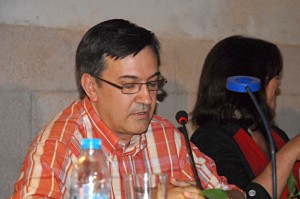 |
| Α. Κούκος |
Ο Ανδρέας Κούκος, ιστορικός, καθηγητής στην Στρατιωτική Σχολή και πρόεδρος του Συλλόγου Μελέτης του έργου του Ι. Καποδίστριας, συνοψίζοντας τα λεγόμενα των προηγούμενων εισηγητών, αναφέρθηκε και στις πολλαπλές επισκέψεις του τα τελευταία χρόνια στην Αίγινα με την ευκαιρία εκδηλώσεων, ιδίως των Ενεργών Πολιτών και του Δήμου, για την μελέτη και την διάδοση του έργου του Κυβερνήτη αναδεικνύοντας το πρωτοποριακό ρόλο του Ι. Καποδίστρια στον ευρωπαϊκό χώρο. Αναφέρθηκε δε στην ειδική μνεία που κάνει στα γραπτά του ο Χ. Κισσινγκερ στον Ι. Καποδίστρια περιγράφοντας τον ως συνταγματικό διαιτητή της Ευρώπης. Ανήγγειλε δε την προσεχή δημοσίευση, από την εταιρία της οποίας είναι πρόεδρος, σημαντικών νέων αρχειακών πηγών για τον Καποδίστρια από τις ευρωπαϊκές χώρες. Τονίζοντας την σπουδαιότητα της ιστορικής αρχειακής έρευνας και των αρχείων, ο Α. Κούκος θύμισε την μοναδική αξία του μικρού τοπικού καποδιστριακού αρχείου της Αίγινας, πρώτου κρατικού ελληνικού αρχείου, του οποίου πρέπει να διαφυλαχτεί η προσβασιμότητα.
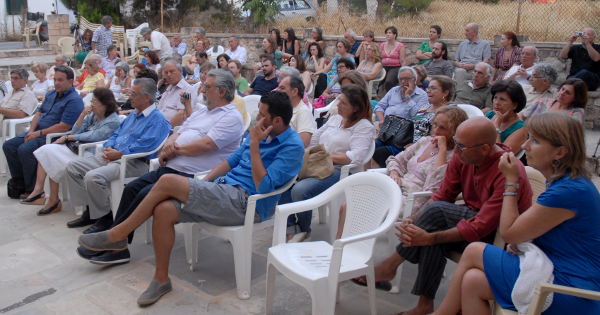 |
| Συζήτηση |
Στη μακρά και έντονη συζήτηση που ακολούθησε, εκφράσθηκε ο βαθύς προβληματισμός και οι ανησυχίες των πολιτών μπροστά στην δομική και μακροχρόνια κρίση την οποία ζούμε και προτάθηκε η σύνταξη μιας Διακήρυξης της Αίγινας, στην κατεύθυνση του εκδημοκρατισμού του Ευρωπαϊκού οικοδομήματος στο πνεύμα του Ι. Καποδίστρια και του Α. Σπινέλλι. Πρόταση των Ενεργών Πολιτών βρίσκεται σε εξέλιξη σε συνεννόηση με το Δήμο της Αίγινας για την ευρωπαϊκή αναγνώριση του έργου του Καποδίστρια και μάλιστα την ονοματοδοσία σημαντικού κοινοτικού κτιρίου στις Βρυξέλλες προς τιμή του Κυβερνήτη.
Ο Wayne Hall, Η Ζωή Γεωργιάδου και ο Στράτος Πανταβός.
1η Νοεμβρίου 2013
Από το κανάλι VMedia της Αθήνας. Συνεχίζεται η συζήτηση που ξεκίνησε στην Αίγινα στις 23 Ιουνίου 2013. Με τον Giulietto Chiesa - δημοσιογράφο, πρώην ευρωβουλευτή - και τον Virgilio Dastoli, πρώην γραμματέα του Altiero Spinelli, μέλος της Ομάδας Spinelli, πρόεδρο του Movimento Europeo. Συμμετέχουν ο Στράτος Πανταβός και ο Wayne Hall του Συλλόγου Ενεργών Πολιτών της Αίγινας και ο Θάνος Κονταργύρης της κίνησης πολιτών ATTAC-Hellas.European Union: disintegration or a new beginning?
This is the question posed by the crisis we are living through, which has triggered so much speculation (!) over the fate of Greece.
Ioannis Capodistrias, Altiero Spinelli: two emblematic personalities of pan-European stature marking two different phases of the course towards a united citizens’ Europe. Anyone who has visited the European Parliament will be well aware that Spinelli plays the same symbolic role for the political circles of the European Union as Capodistrias plays for the majority of Greeks who regard the establishment of the modern Hellenic state in 1828, at Aegina, as a historic advance not just for the citizens of this country but for Europe as a whole.
Today in the midst of crisis the European Union seems vis-à-vis Greece and other EU member countries to be introducing policies that are extremely problematic for the peoples of Europe. Is it possible in this conjuncture for anyone to believe that the ideas of these two visionaries, Capodistrias and Spinelli, have any chance of influencing the reality of our days and opening new prospects for the European Union?
Our three speakers will attempt to provide an answer to this.
Andreas Koukos
Andreas Koukos was born in Chania, Crete. He studied at the law school of the Aristotelian University of Thessaloniki and the Officers’ Military Academy and holds a post-graduate diploma in Naval Science and Strategy from the Naval War College. He is also a graduate of the National Defense College. In 2012 he completed his doctorate in the Philosophical Faculty of the University of Athens. He is a professor of modern history at the National Defense College and the Naval War College, has participated in numerous scholarly symposia in Greece and abroad and has published articles in scholarly journals. He has been consultant to the Capodistrian Cities Network has won a number of awards and distinctions. He is a Brigadier in the the Corps of Legal of Consultants of the Greek Armed Forces.
On 21st September 2010 he founded the “Association for the Study of the Work of Ioannis Capodistrias”, currently serving as its first president.
Giulietto Chiesa
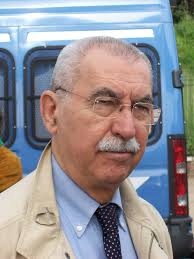
Giulietto Chiesa was born in 1940 in Piedmont. In the 1980s during the Berlinguer period he was a correspondent for the L’Unita newspaper and then for La Stampa, experiences which transformed him into one of the world’s best “Sovietologists”. He has written for a number of different newsagencies of Russia, the USA, Switzerland and Germany, as well as broadcasts for Vatican Radio. In his articles, which are required reading for comprehension of the USSR in its last years, he examines globalization, the international system and the media, and the wars of recent decades. From 2004 to 2008 he was a Europarliamentarian. In the 2009 European elections he was a candidate for the Party of Human Rights in Latvia, a member of the parliamentary grouping of the Greens which promotes the human rights of Russian speakers in Latvia. He is a member of the New Policy Forum of the former president of the USSR Mikhail Gorbachev.
Panagiotis Paspaliaris
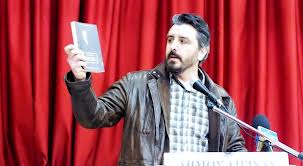
Panagiotis Paspaliaris was born in Nafplion in 1975. He studied history and archaeology at the Aristotelian University of Thessaloniki. He is the author of “The Drachma” (2007), “Great Hellenes: Ioannis Capodistrias” (2008), “Great Hellenes, Pericles” (2009). “The History of Mediaeval Hellenism in Asia Minor” (2010). He works in the private sector and is a regular contributor to the magazine Hot Doc on historical and other subjects.
The meeting will be co-ordinated by Zoe Georgiadou.
Direct democracy cannot substitute for parliamentary democracy. If it confines itself to abusing and criticising parliamentarianism it will simply remain a second clientele for the corporate mass media, to be pitted against the parliaments in a «divide-and-rule» game refereed by the media. The «indignados» must move on and propose a system of organized competition between direct democracy and parliamentary democracy, to be enshrined in new constitutions.
There is a general recognition even in the mass media today that the liberal democratic political system is in terminal crisis and that what is needed are new forms of citizens’ democracy, direct democracy, deliberative democracy.There are many names for it.
What one unfortunately never sees, though, is specific, easily understandable blueprints of the forms that this citizens’ democracy might take, what its relationship would be with the existing forms of multi-party liberal democracy or parliamentary democracy, what its relationship would be with existing forms of direct democracy, such as referenda, plebiscites, the activity of citizens’ groups, non-governmental organizations, and so on.
The Swiss model is often cited and here I think it is worth a mention that the forms of democracy that exist today in the Swiss confederation, and indeed Swiss neutrality, are very largely the work of someone we mention frequently: the first governor of modern Greece, Ioannis Capodistrias. The specific type of polity of modern Switzerland was designed to keep the country out of the sphere of influence both of France and of Austria, which in the nineteenth century was of course among the great powers. Capodistrias was the foreign minister of the Czar of Russia at this time, and Russia had the most rational of geopolitical reasons to try to reduce the influence both of France and of Austria.
Having said that, does the Swiss model of direct democracy have anything to offer? Does it suit our specific needs now? We would argue that it doesn’t, because it does nothing to curb the power of mainstream mass media. The mass media can influence the outcome of a referendum just as easily as they can influence the outcome of an election. This is particularly the case if the subject of the referendum is in any way complicated or technical.
What is the situation with the mass media? Quite simply that the priority is on deceit and distortion. The most important realities will be subject to media blackout. What cannot be blacked out will be distorted to guarantee confusion and non-comprehension to all but the tiny minority that has found out the reality by other means. Issues that are given systematic high-profile media attention are very often fictitious.

Politicians who rely on this mass media for their election, that is to say virtually all politicians, cannot be expected to bring it under social control. The only solution then is to organize around it. In the age of the internet, unless it too comes to be controlled as tightly as the media, this is technically possible.
The desideratum, then, is for an Independent Citizens’ Assembly to be established. Independent citizens are citizens who can communicate with each other and with political supporters directly, not via channels that are mediated and under the control of others who can give and withdraw support whenever they want to, and also distort, change and manipulate content whenever they want to. Politicians and public figures who appear on the media that is not under citizens’ control should not have the right to a vote in the Citizens’ Assembly. They should have the right to act as advisors if their advice is sought, but not to participate in voting or decision making. This amounts to nothing more than restoration of a convention that used to exist in Westminster democracy before the age of the NGO in the form of a professional civil service. Civil servants were not supposed to speak directly to the media, but only through their responsible minister. The Citizens’ Assembly would restore, and indeed itself assume, some of these functions that used to be assumed by a professional civil service.
The Citizens’ Assembly would seek to compete with the universal suffrage parliament through a periodic referendum say once every five years that could decide on whether legislative powers should for the coming five year period be exercised by the Citizens’ Assembly or by the universal suffrage parliament. Whichever legislature lost the referendum would have merely an advisory, not a legislative, role. If the Citizens’ Assembly should win the referendum at the Pan-Hellenic or Pan-European level, this would automatically entail transfer of powers from the multi-party legislatures to the citizens’ assemblies at every lower level: national, regional and municipal, subject to challenge at these lower levels, where local referenda could be organized at the initiative of the losing side. This situation would be reversible, applicable also if the pan-European mandate should go to the multiparty legislature.
At the level of the European Union, the head of state should be chosen by a body of electors made up of the heads of state of the member countries and representatives either of the multi-party legislatures or of the citizens’ assemblies, whichever held the mandate. This would help to deal with one important source of the lack of legitimacy of the European Union which treats the national parliaments of the member states as if national sovereignty is vested in them. Sovereignty in Great Britain, to take just one example, is not vested in the parliament. It is vested in the Crown in Parliament.
The Citizens’ Assembly would have to make it clear at all times that it is not a political party. The political party allegiance of members of the Citizens’ Assembly, and other forms of allegiance such a membership of trade unions, employers associations, non-governmental organizations and so on, would be relegated to private status, similar to the status of a citizen’s religion in a properly functioning secular democracy. There would have to be a court with powers to judge when a member’s behaviour in the citizens’ assemblies was in violation of this rule. Any person behaving in a citizens’ assembly like the member of a party would be required to withdraw from the citizens’ assembly and participate in public life through the multi-party assemblies, not the independent citizens ‘assemblies. This is just a brief sketch of how a Hellenic and/or European Citizens’ Assembly could be feasible and how it could operate. There is nothing stopping European citizens from making the first move towards constructing such an assembly, and seeking powers for it. Under Article 11, paragraph 4 of the Treaty of Lisbon, “not less than one million citizens who are nationals of a significant number of Member States may take the initiative of inviting the European Commission, within the framework of its powers, to submit any appropriate proposal on matters where citizens consider that a legal act of the Union is required for the purpose of implementing the Treaties.”


